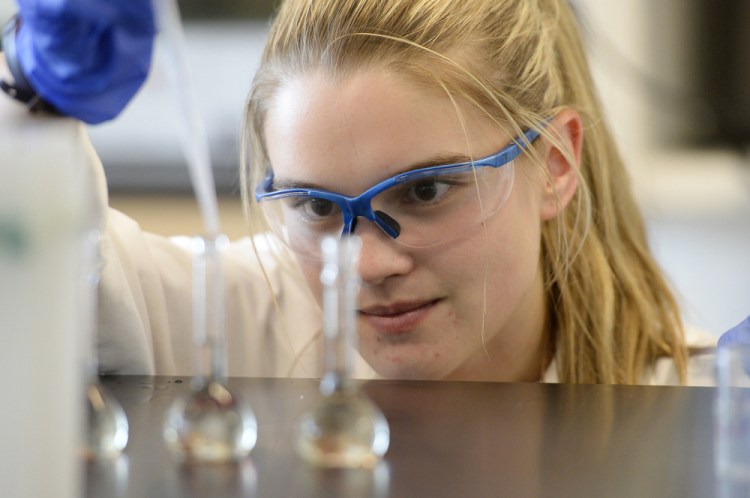University of Southern Maine chemistry professor Lucille Benedict understands that chemistry classes can seem a little dull. So she found something a lot of college students enjoy to make it more interesting: beer.
Her ah-ha moment occurred four years ago when she was touring the Allagash Brewing Co. on Portland’s Industrial Way. That’s where she met Zach Boda, Allagash’s head of quality control, who talked about the kind analysis and chemical testing he wished the brewery could do.
“The courses I teach (do) that stuff,” said Benedict. “It’s not always easy to get students engaged in chemistry, so it was just a perfect match.”
She began using beer as a testing medium to teach chemistry. Now Benedict is in charge of the school’s new Quality Assurance/Quality Control and Research Laboratory, which started with a $488,514, three-year seed grant from the Maine Economic Improvement Fund. The lab has partnered with the Maine Brewers Guild to provide testing and training for breweries and brewmasters.
Classes – for brewers – begin this fall with a focus on ways that beer can get contaminated or ruined by imperfections in the brewing process. Brewers will also be able to send samples to the lab for testing.

Beer samples await analysis in the beer lab at the University of Southern Maine. Shawn Patrick Ouellette/Staff Photographer
The combination of educating students while providing a valuable service to the state’s growing craft brew industry has been a boon for both.
Student Ciera Wentworth, a 20-year-old from Pownal who turns 21 this month, was glad to get out of textbooks and into the laboratory.
“I was just really excited to really apply chemistry,” Wentworth said. “A lot of people take chemistry (class) and they’re like, ‘I hate this.’ But if you show them in that chemistry class that they can be testing beer, or something they can actually be interested in, I just find it more applicable and fun. I want to pursue that as a path because it’s new and different and you’re constantly discovering new things.”
Before the lab’s opening, brewers would spend hundreds of dollars to ship beer out of state for testing. The USM lab charges $25 for basic testing, and brewers can add more tests a la carte. Requests have come from as far as breweries in Vermont.
GREAT HELP TO MAINE BREWERS
On a recent morning, Benedict picks up beer samples from local breweries on her drive into work. The lab is already busy testing samples when she arrives, and despite the fact that there’s a part-time lab manager, Benedict is “overwhelmed with stuff to do.” What started as a dalliance with beer here and there in freshman chemistry classes has grown into a nearly full-time job.
But she says her payoff is working with students in the lab.
There, a beer refrigerator is stocked to the gills. Unlike most college fridges, this one contains nothing but high-quality Maine beer. And there’s no drinking in the lab, whether you are of legal age or not.
Student Jacob Burce was quick to point out the no-drinking rule to a thirsty reporter who was ogling Foundation’s Afterglow IPA in the fridge. Instead of popping a can open, Burce eagerly showed off the flame atomic absorption spectrometer. He and Wentworth were using the machine to torch samples of beer and analyze light waves to determine how much zinc was in it.

Professor Lucille Benedict, center, works with students in the beer lab at USM. Classes for brewers this fall will focus on how beer can get contaminated during the brewing process.
Analyzing beer is a hook to get students interested, Burce said, but it could just as easily be tea, coffee or water. The fact that he’s helping local companies identify possible problems or ways to improve their products is what gets him excited. Especially when the craft beer boom in Maine has led to at least 83 open breweries in the state, according to the Maine Brewers Guild.
“It means a lot to see a Maine (industry) blowing up the way it is,” Burce said. “Not just Allagash and Rising Tide, but the whole craft industry has sort of taken Portland by storm recently. It seems like a good industry to be in.”
SOLVING REAL-LIFE PROBLEMS
Wentworth agrees. The attraction is applying science to solve a real-world problem.
“It could be coffee or something else, but for me it’s just the science,” she said of the appeal of working in the lab.
That is music to Benedict’s ears. She acknowledges it’s cool to run a beer-testing lab, although she’s also a fan of wine and mead. She brews her own beer at home, but Benedict says her husband drinks most of it or they give it away.
Benedict is glad she’s in a position to help Maine businesses, but mostly she’s excited that she gets to engage Maine students.
“(The beer lab) is great because it’s been proven that if you have students working at the university, they are much more likely to stay and to graduate,” she said.
Send questions/comments to the editors.



Comments are no longer available on this story